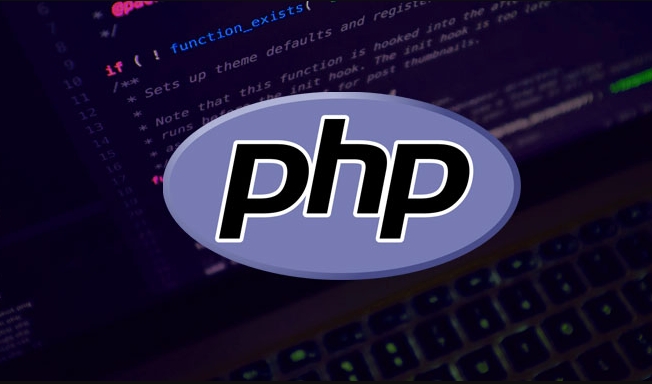PHP does not directly support wildcard searches in arrays, but can be implemented through fnmatch(), preg_grep() or custom functions. 1. fnmatch() supports shell-style wildcards, such as matching arbitrary characters, ? Match a single character, which is suitable for Unix systems and Windows environments in PHP 8; 2. preg_grep() uses regular expressions to provide more flexible pattern matching, such as /a/ matching elements containing a; 3. Custom functions can convert wildcards into regular expressions to implement specific rules, such as converting them to .* for matching. In addition, attention should be paid to performance optimization, case processing and special character testing.

When you're working with PHP arrays and need to search for elements that match a certain pattern, wildcards can be helpful. However, PHP doesn't support wildcard searches in arrays directly out of the box like some other languages ??or databases might. You'll need to implement custom logic depending on your needs.

Here are a few practical ways to use wildcard-like behavior when searching through PHP arrays.

Using fnmatch() for Wildcard Matching
If you're familiar with shell-style wildcards (like * for any number of characters and ? for a single character), fnmatch() is a great tool. It works well on Unix-based systems but may not behave the same way on Windows unless you're using PHP 8.
$array = ['apple', 'banana', 'cherry', 'date'];
$matches = array_filter($array, function($item) {
return fnmatch('*a*', $item); // Matches any item containing 'a'
});-
*matches zero or more characters. -
?matches exactly one character. - Use this inside
array_filter()for filtering array items.
Keep in mind: This function is case-sensitive by default. If you want case-insensitive matching, convert both strings to lowercase first or use the FNM_CASEFOLD flag:

fnmatch('*a*', $item, FNM_CASEFOLD);
Using Regular Expressions with preg_grep()
If you're comfortable with regex, preg_grep() is another powerful option. It allows you to search an array using regular expressions, which gives you much more flexibility than simple wildcards.
$array = ['apple', 'banana', 'cherry', 'date']; $matches = preg_grep('/a/', $array); // Finds all items containing 'a'
Some useful patterns:
-
/^a/– starts with 'a' -
/a$/– ends with 'a' -
/a.*z/– contains 'a' followed by any characters then 'z'
This method is especially handy if you're doing complex pattern matching.
Building a Custom Wildcard Search Function
If neither fnmatch() nor preg_grep() fits your exact needs, writing a custom function can help. For example, if you want to translate a basic wildcard string into a regex pattern:
function wildcard_match($pattern, $subject) {
$pattern = str_replace(['\*', '\?'], ['.*', '.'], preg_quote($pattern, '/'));
return (bool) preg_match("/^{$pattern}$/i", $subject);
}
$array = ['apple', 'banana', 'cherry', 'date'];
$matches = array_filter($array, function($item) {
return wildcard_match('*an*', $item); // Matches banana, etc.
});This approach lets you define your own rules for how wildcards should behave and can be extended easily.
A Few Notes Before You Go
- Performance matters — looping through large arrays repeatedly can get slow.
- Consider pre-filtering or caching results if you're doing multiple searches.
- Make sure to test edge cases, especially around uppercase/lowercase handling and special characters.
Basically that's it.
The above is the detailed content of how to use wildcards to search a php array. For more information, please follow other related articles on the PHP Chinese website!

Hot AI Tools

Undress AI Tool
Undress images for free

Undresser.AI Undress
AI-powered app for creating realistic nude photos

AI Clothes Remover
Online AI tool for removing clothes from photos.

Clothoff.io
AI clothes remover

Video Face Swap
Swap faces in any video effortlessly with our completely free AI face swap tool!

Hot Article

Hot Tools

Notepad++7.3.1
Easy-to-use and free code editor

SublimeText3 Chinese version
Chinese version, very easy to use

Zend Studio 13.0.1
Powerful PHP integrated development environment

Dreamweaver CS6
Visual web development tools

SublimeText3 Mac version
God-level code editing software (SublimeText3)
 PHP Variable Scope Explained
Jul 17, 2025 am 04:16 AM
PHP Variable Scope Explained
Jul 17, 2025 am 04:16 AM
Common problems and solutions for PHP variable scope include: 1. The global variable cannot be accessed within the function, and it needs to be passed in using the global keyword or parameter; 2. The static variable is declared with static, and it is only initialized once and the value is maintained between multiple calls; 3. Hyperglobal variables such as $_GET and $_POST can be used directly in any scope, but you need to pay attention to safe filtering; 4. Anonymous functions need to introduce parent scope variables through the use keyword, and when modifying external variables, you need to pass a reference. Mastering these rules can help avoid errors and improve code stability.
 How to handle File Uploads securely in PHP?
Jul 08, 2025 am 02:37 AM
How to handle File Uploads securely in PHP?
Jul 08, 2025 am 02:37 AM
To safely handle PHP file uploads, you need to verify the source and type, control the file name and path, set server restrictions, and process media files twice. 1. Verify the upload source to prevent CSRF through token and detect the real MIME type through finfo_file using whitelist control; 2. Rename the file to a random string and determine the extension to store it in a non-Web directory according to the detection type; 3. PHP configuration limits the upload size and temporary directory Nginx/Apache prohibits access to the upload directory; 4. The GD library resaves the pictures to clear potential malicious data.
 Commenting Out Code in PHP
Jul 18, 2025 am 04:57 AM
Commenting Out Code in PHP
Jul 18, 2025 am 04:57 AM
There are three common methods for PHP comment code: 1. Use // or # to block one line of code, and it is recommended to use //; 2. Use /.../ to wrap code blocks with multiple lines, which cannot be nested but can be crossed; 3. Combination skills comments such as using /if(){}/ to control logic blocks, or to improve efficiency with editor shortcut keys, you should pay attention to closing symbols and avoid nesting when using them.
 How Do Generators Work in PHP?
Jul 11, 2025 am 03:12 AM
How Do Generators Work in PHP?
Jul 11, 2025 am 03:12 AM
AgeneratorinPHPisamemory-efficientwaytoiterateoverlargedatasetsbyyieldingvaluesoneatatimeinsteadofreturningthemallatonce.1.Generatorsusetheyieldkeywordtoproducevaluesondemand,reducingmemoryusage.2.Theyareusefulforhandlingbigloops,readinglargefiles,or
 Tips for Writing PHP Comments
Jul 18, 2025 am 04:51 AM
Tips for Writing PHP Comments
Jul 18, 2025 am 04:51 AM
The key to writing PHP comments is to clarify the purpose and specifications. Comments should explain "why" rather than "what was done", avoiding redundancy or too simplicity. 1. Use a unified format, such as docblock (/*/) for class and method descriptions to improve readability and tool compatibility; 2. Emphasize the reasons behind the logic, such as why JS jumps need to be output manually; 3. Add an overview description before complex code, describe the process in steps, and help understand the overall idea; 4. Use TODO and FIXME rationally to mark to-do items and problems to facilitate subsequent tracking and collaboration. Good annotations can reduce communication costs and improve code maintenance efficiency.
 Quick PHP Installation Tutorial
Jul 18, 2025 am 04:52 AM
Quick PHP Installation Tutorial
Jul 18, 2025 am 04:52 AM
ToinstallPHPquickly,useXAMPPonWindowsorHomebrewonmacOS.1.OnWindows,downloadandinstallXAMPP,selectcomponents,startApache,andplacefilesinhtdocs.2.Alternatively,manuallyinstallPHPfromphp.netandsetupaserverlikeApache.3.OnmacOS,installHomebrew,thenrun'bre
 How to access a character in a string by index in PHP
Jul 12, 2025 am 03:15 AM
How to access a character in a string by index in PHP
Jul 12, 2025 am 03:15 AM
In PHP, you can use square brackets or curly braces to obtain string specific index characters, but square brackets are recommended; the index starts from 0, and the access outside the range returns a null value and cannot be assigned a value; mb_substr is required to handle multi-byte characters. For example: $str="hello";echo$str[0]; output h; and Chinese characters such as mb_substr($str,1,1) need to obtain the correct result; in actual applications, the length of the string should be checked before looping, dynamic strings need to be verified for validity, and multilingual projects recommend using multi-byte security functions uniformly.
 Learning PHP: A Beginner's Guide
Jul 18, 2025 am 04:54 AM
Learning PHP: A Beginner's Guide
Jul 18, 2025 am 04:54 AM
TolearnPHPeffectively,startbysettingupalocalserverenvironmentusingtoolslikeXAMPPandacodeeditorlikeVSCode.1)InstallXAMPPforApache,MySQL,andPHP.2)Useacodeeditorforsyntaxsupport.3)TestyoursetupwithasimplePHPfile.Next,learnPHPbasicsincludingvariables,ech






